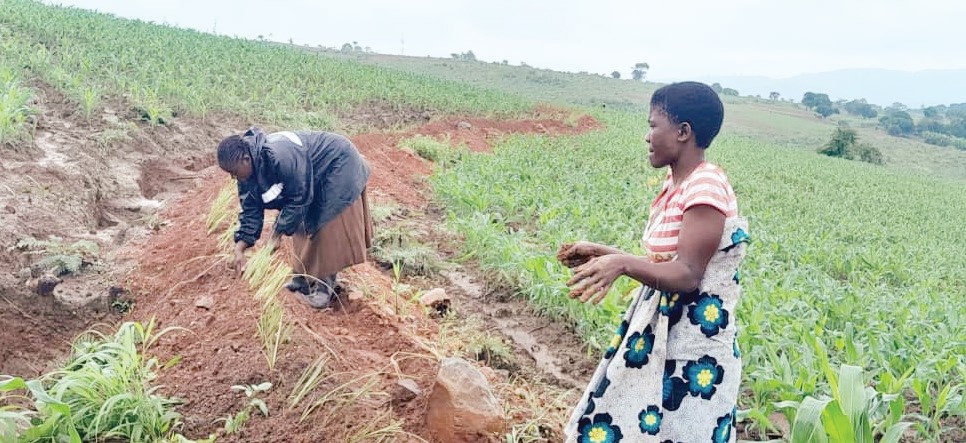From gullies to swales
Down the rain-drenched Chiwvanyuma slopes in Rumphi District, Emmie Gondwe, 35, is defying the course of nature to grow food and cash crops.
The single mother of three lives in Chikakula Village, Traditional Authority Mwalweni in the district, where she makes the most of the crop fields that drape the steep slopes gradually left bare and gullied by years of felling trees to clear the land for tobacco growing and processing for the world market.

Here, she harvests at least 60 bags of maize and 45 bales of tobacco.
But that was not the case before she and other farmers in her rural setting adopted new farming practices to conserve land.
The farming community has constructed swales across the downslopes to reduce soil erosion. The shallow channels trap rainwater, slow run-offs and allow it to sink into the ground for the benefit of the crops even when dry spells kick in.
“I used to harvest very little as running water constantly swept away fertile soil and half my crops,” she says. “The problem has been worsening since our forefathers ploughed the hills, but now we have found a solution.”
The swales are among the soil and water conservation strategies under the Climate-Smart Enhanced Public Works Programme, a component of the Social Support for Resilient Livelihoods Project (SSRLP).
However, accepting the new methods proved hard. It faced widespread resistance from local farmers who found the digging back-breaking, time-consuming and a waste of land.
“First, I rejected the swale methods because the channels were too many and this reduced my land size,” says Emmie.
But now she encourages farmers cultivating on these slopes to start using swales.
Every season, the woman and her community dig swales and cover them with vetiver grass. Under the climate-smart communal works, they receive K28 000 which they use to buy livestock, farm inputs and household needs.
Stella Gondwe, leader of Chiwvanyuma Hotspot in Ntchenachena Catchment Area, hails the project for helping the community tackle soil erosion and boost their crop yields.
Some of the farmers who opposed the new methods now want the initiative to continue because it assures them of sustainable food security,” she says.
Over 10 farmers have benefitted from the project at Chivwanyuma Hotspot. They have established a village banking group where every member gets over K100 000 depending on their shares. However, the farmers want the government to increase the pay for communal work, including digging the swales.
Rumphi district project facilitator Hastings Makonokaya says the programme funded by the World Bank is one of the government interventions to restore degraded landscapes and promote sustainable environmental management amid the harsh effects of climate change.
In Rumphi, the project is being implemented in 13 catchment areas divided into hotspots.
“The project covers three sectors, including forestry where we plant trees and regeneration of degraded forests. The land resources area is where we have swales, check dams and mother ridges,” he says.
The project has empowered communities in Rumphi to conserve 7 384 hectares (ha). This includes 6 804ha of degraded land and 580ha of endangered forests.
SSRLP is a government project funded through the Multi Donor Trust Fund and the World Bank.
The National Local Government Finance Committee facilitates the project in the country’s 28 district councils.





